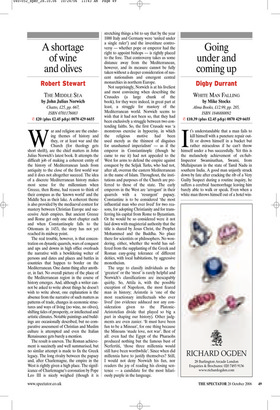A shortage of wine and olives
Robert Stewart
THE MIDDLE SEA by John Julius Norwich Chatto, £25, pp. 667, ISBN 0701176083 ✆ £20 (plus £2.45 p&p) 0870 429 6655 War and religion are the enduring themes of history and they, or at least war and the Church (for theology gets short shrift), are the chief matters in John Julius Norwich’s latest book. It attempts the difficult job of making a coherent entity of the history of Mediterranean lands from antiquity to the close of the first world war and it does not altogether succeed. The idea of a discrete Mediterranean history makes most sense for the millennium when Greece, then Rome, had reason to think of their compass as the ‘known world’ and the Middle Sea as their lake. A coherent theme is also provided by the mediaeval contest for mastery between Christian Europe and successive Arab empires. But ancient Greece and Rome get only one short chapter each and when Constantinople falls to the Ottomans in 1453, the story has not yet reached its midway point.
The real trouble, however, is that concentration on dynastic quarrels, wars of conquest and ups and downs in high office overloads the narrative with a bewildering welter of persons and dates and places and battles in countries that happen to border on the Mediterranean. One damn thing after another, in fact. No overall picture of the place of the Mediterranean region in the course of history emerges. And, although a writer cannot be asked to write about things he doesn’t wish to write about, one explanation is the absence from the narrative of such matters as patterns of trade, changes in economic structures and ways of living (no wine, no olives), shifting tides of prosperity, or intellectual and artistic climates. Notable paintings and buildings are occasionally described, but no comparative assessment of Christian and Muslim culture is attempted and even the Italian Renaissance gets barely a mention.
The result is uneven. The Roman achievement is succinctly and well summarised, but no similar attempt is made to fix the Greek legacy. The long rivalry between the papacy and, after Charlemagne, the empire in the West is rightly given a high place. The significance of Charlemagne’s coronation by Pope Leo III is nicely weighed (though it is stretching things a bit to say that by the year 1000 Italy and Germany were ‘united under a single ruler’) and the investiture controversy — whether pope or emperor had the right to appoint bishops — is rightly placed to the fore. That controversy takes us some distance away from the Mediterranean, however, and its measure cannot be fully taken without a deeper consideration of nascent nationalism and emergent central monarchies in northern Europe.
Not surprisingly, Norwich is at his liveliest and most convincing when describing the Crusades (a large chunk of the book), for they were indeed, in great part at least, a struggle for mastery of the Mediterranean world. Norwich seems to wish that it had not been so, that they had been exclusively a struggle between two contending faiths. So, the first Crusade was ‘a monstrous exercise in hypocrisy, in which the religious motive had been used merely as the thinnest of disguises for unashamed imperialism’ — as if the emperor in Constantinople (though he came to rue it) had not appealed to the West for arms to defend the empire against conquest by the Seljuk Turks, who had not, after all, overrun the eastern Mediterranean in the name of Islam. Throughout, the institutions and purposes of the Church are preferred to those of the state. The early emperors in the West are ‘arrogant’ in their quarrels with a ‘resurgent’ papacy. Constantine is to be considered ‘the most influential man who ever lived’ for two reasons, for adopting Christianity and for transferring his capital from Rome to Byzantium. Or he would be so considered were it not laid down with magisterial authority that the title is shared by Jesus Christ, the Prophet Mohammed and the Buddha. No place there for scientists or philosophers. No wondering, either, whether the world has suffered from the supplanting of the Greek and Roman easy-going tolerance of different deities, with local habitations, by aggressive monotheism.
The urge to classify individuals as the ‘greatest’ or the ‘most’ is rarely helpful and Norwich’s classifications are inescapably quirky. So, Attila is, with the possible exception of Napoleon, the most feared man in history; Aristotle is ‘one of the most reactionary intellectuals who ever lived’ (no evidence adduced nor any consideration given to the PlatonicAristotelian divide that played so big a part in shaping our history). Other judgments are even zanier. ‘It must have been fun to be a Minoan’, for one thing because the Minoans ‘made love, not war’. Best of all: even had the Egypt of the Pharaohs produced nothing but the famous bust of Nerfertiti, ‘those three millennia would still have been worthwhile’. Since when did millennia have to justify themselves? Still, I would not deny Norwich his fun, nor readers the joy of reading his closing sentence — a candidate for the most hilariously purple in the language.


























































































 Previous page
Previous page